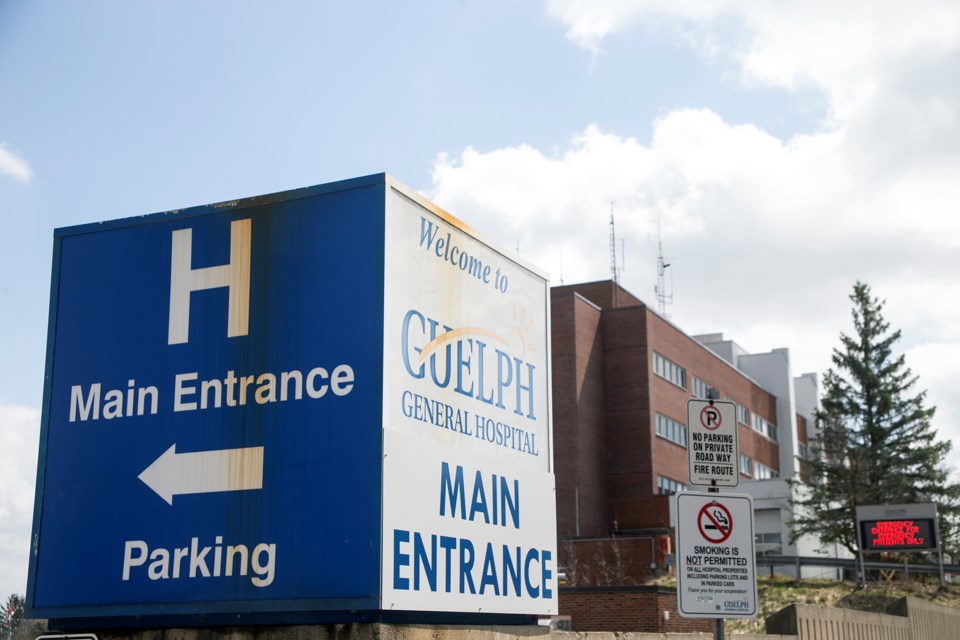A Wellington North woman who was treated for shoulder injuries at Guelph General Hospital (GGH) is suing for $2.5 million, claiming an infection after surgery led to a permanent reduction in her ability to earn income and maintain her home, as well as limited her ability to initiate, maintain and sustain an interdependent relationship and/or marriage.
The woman filed a lawsuit earlier this month against GGH and two orthopaedic surgeons in relation to an injury that occurred in late 2020. She’s seeking $2 million for specific damages and $500,000 for general damages.
“(Her) injuries have had an extensive impact on her life in all aspects of daily living and have substantially deprived her of her enjoyment of life,” reads a statement of claim filed in Guelph. “It is unknown what additional surgeries or procedures will be necessary in the future, but it is known that her ability to perform the usual tasks of daily living remain grossly impaired.”
None of the allegations have been proven in court and no statements of defence have been filed in this case.
As is standard regarding cases before the court, a spokesperson for GGH declined to comment.
The situation began to take shape on Dec. 29 of 2020 when the woman, then 65, tripped on a set of deck stairs, hit her head on a parked vehicle and landed headfirst on the ground, as explained in lawsuit documents. She momentarily lost consciousness and reportedly experienced “sharp pain” in her shoulders.
The plaintiff was taken to Louise Marshall Hospital in Mount Forest where the dislocation in her right shoulder was reduced. After X-rays were reviewed, she was referred to GGH for further assessment and urgent surgical repair.
The next day she was transported to the Guelph hospital, where an orthopaedic surgeon determined surgical repair wasn’t needed and she was instead urged to follow up with him at the hospital’s fracture clinic on Jan. 5.
That’s when she underwent additional diagnostic imaging tests which demonstrated unchanged deformities and fractures in her shoulders. The surgeon said her right shoulder didn’t require surgery but her left shoulder likely needed to be replaced, a procedure known as hemiarthroplasty.
On Feb. 4, 2021, that replacement surgery went ahead, along with a bone graft, bicep tenotomy and tenodesis.
“Despite no complications being noted in his operative report, (the surgeon) encountered difficulties intraoperatively due to the time elapsed since injury and resulting adhesions,” says the statement of claim. “Postoperatively, (she) complained of chest wall pain and nausea. She was noted to have puffiness/fullness on her chest wall to the surgical site compared to the contralateral side and concern was noted in the recovery room about bleeding from the wound and it possibly needing reinforcement.”
A second orthopaedic surgeon was brought in to assess the situation and determined there was “no evidence of acute bleeding and that the swelling was in keeping with the surgery that (the woman) had just undergone,” the lawsuit says, noting she was subsequently discharged and sent home.
During a discharge consultation with the initial surgeon on April 6, the Wellington North woman reported experiencing continued pain, swelling, restricted range of motion and heat radiating from the incision site, but no follow-up investigations were ordered.
Instead he allegedly administered a cortisone injection to the woman's left shoulder to reduce the pain and inflammation and told her to follow up with the clinic if problems persist.
In the lawsuit the plaintiff claims her “clinical picture was in keeping with infection secondary to hardware implantation which is not uncommon in a hemiarthroplasty post-operative course.”
The cortisone shot “caused or contributed to the infection,” the claim adds, noting cortisone is contraindicated in the presence of suspected infection and could accelerate the infection process.
Still experiencing symptoms, she visited her family doctor on June 3 and was advised to go to the emergency department for “immediate assessment of possible infection/septic joint.”
This prompted her to attend Grand River Hospital in Kitchener where she was given an urgent referral to another orthopaedic surgeon, who saw her six days later.
“Following assessment, the orthopaedic surgeon opined that there was an infection in the left shoulder at the surgical site, likely caused or contributed to by the cortisone injection,” the lawsuit claims. “Given the presence of the infection, the non-functional status of the shoulder, and (her) poor prognosis with therapy alone, surgical revision was recommended.”
That replacement process involved two surgeries – one on Aug. 14 and another on Nov 1.
